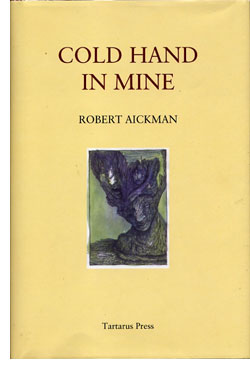 |
 |

Robert Aickman
Cold Hand in Mine
Reviewed by: Rick Kleffel © 2011
Tartarus Press
UK Hardcover Limited Edition
ISBN 978-1-905-78434-9
Publication Date: 07-19-2011
298 Pages; £32 ; $50
Date Reviewed: 12-19-2011
Index:
General Fiction
Horror
Fantasy
Human beings created science — which for some, undid our belief in our own creator. The recently discovered fact that we are hard-wired to believe in religion is rife with the sort of irony that neither science nor religion is particularly good at understanding. We are caught between the two poles of quantum belief, scientific and spiritual; the seedy and the sublime. The two parts of us often cross paths, and in those moments, we are likely to experience the stuff of Robert Aickman's "strange stories," ineffable instants that offer a particularly clear glimpse at our own dual natures.
'Cold Hand in Mine,' the latest volume of Aickman's stories to be meticulously reprinted by Tartarus Press, is yet another superb example of how fine literature and reading can help illuminate a dimly understood part of our everyday experience. Aickman's stories, which lay well outside the confines of any easily described genre, are powerful and entertaining explorations of the common life and the uncommon unconscious. Aickman was careful to call his work "strange stories" for a good reason. There's no way to pin down and little reason to limit these tales. They're superb example of written literature, doing something that can only be done with words extraordinarily well. They're enjoyable and unsettling.
'Cold Hand in Mine' is a particularly auspicious collection. The introduction to the Tartarus Press Edition, by Phil Baker, provides a suitable overview to the author's work in general and this collection in particular. He talks about the import of the stories and some of the symbolism, but doesn't dwell too much on the plot. He provides a work readers can read either before or after the stories themselves.
The stories here are among Aickman's best. In "The Swords," a young traveling salesman comes upon a circus-tent show featuring an alluring young woman, a sullen, all-male audience and a low-key, disturbingly symbolic illusion. When he learns that "private shows" are available, our narrator engages the services of the young woman. Aickman nails the gritty, uncouth setting to a tee and the naïve narrator's perception proves to be perfectly-suited for the revelations that follow.
"The Real Road to the Church" proves to be through the dwelling of a lonely woman, and those who follow that road offer the reader a sense of place that is chillingly beautiful. "Niemandswasser" is another story of a place that is too entrancing for the good of those who live there, a story of layered perceptions that add up to more than can be adequately explained by lakes so dark they seem to contain eternity beneath their surface. Aickman's evocation of the Freud's notion of the uncanny is unsettling and memorable.
"Pages from a Young Girl's Journal" shows what Aickman can do when he tackles a familiar trope, the vampire, with his peculiar "strange story" approach. A winner of the World Fantasy Award that is sometimes dismissed by Aickman purists, this story perfectly encapsulates the appeal of the vampire without succumbing to any of the clichés. It brings to mind Richard Matheson's gritty and intense "Blood Son," but Aickman's poetic voice is gorgeous, generous and utterly beguiling.
"The Hospice" finds Aickman in a slyly humorous mood, even as he creates a very disturbing, almost Kafkaesque vision or a traveler in need of rest who comes upon a most unrestful place. Suppressed sexuality, silly hi-jinks and sickening suggestions are combined in a rather prescient look at exurbia. A similar setting gets a very different schoolyard-romance treatment in "The Same Dog," which features superb descriptions and a knockout ending.
"Meeting Mr Millar" features a protagonist who is a writer of pornography, stuck in a third-floor apartment above some very odd tenants. It's the longest story in the book and is steeped in seediness and the surreal, with just a hint of something beyond the rational. Finishing the book is "The Clock Watcher," who is the narrator's Black Forest cuckoo clock-obsessed wife. Aickman's descriptions of sounds and the not-nice teller of the tale combine for a maximum creepiness. It's best not read in a room with a ticking clock.
Driving all of these stories is Aickman's superb prose. It's stripped bare and reads lightly but somehow manages to let in things from outside between the words. His compactness carries over to his characters, who come to life in the not-so brief spans of these stories, while his plots seem to encompass far more than one should be able to fit into the relatively tight space he uses.
Aickman's stories are surely worth owning and the Tartarus Press editions more than justify the space they take on the shelf. They are elegant and easy-to-read, austere in the perfect manner for Aickman's work. Tartarus is not making too many of the hardcovers, which will certainly sell out and reach an astronomical price point. Tartarus is doing readers a great favor by publishing these in their original collection format. Coming up, readers can look forward to 'We Are For the Dark,' an anthology edited by and including work by Aickman, and more Aickman collections; enough to satisfy both the seedy and the sublime among us.
|
 |
|
|
 |
| |
Review Archive
All Reviews alphabetized by author.
General Fiction
Non-Genre, general fiction and literature.
Horror
Supernatural fiction, supernatural horror and non-supernatural horror.
Science Fiction
Science fiction, science fantasy, speculative fiction, alternate history.
Fantasy
Fantasy, surrealism and magic realism.
Mystery
Crime, thrillers, mystery, suspense.
Non-Fiction
Non-Fiction, True Crime, Forteana, Reference.
Poetry
|
|
 |
|




